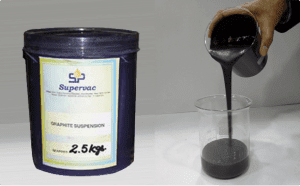
It is but natural that
during the process, material being coated on substrate will fall off in the
vacuum chamber. For example, Aluminum heated and evaporated to be coated on
BOPP film (film metallizing) or on some object (object metallizing) will fall
off on vacuum chamber and shields. Being in molten state this will weld to the
chamber surface. (PHOTO-1)

After a number of work
cycles there will be a buildup of this welded metal which will have large gaps
capable of trapping a lot of air (PHOTO-2).
Photo-2
As it is evident
the porosity holding air will be zigzag as it has been formed randomly. Pumping
system will find it very difficult to remove this trapped air. Hence ultimate
vacuum will drop and vacuum time will increase. It is important therefore that
this build up of molten metal is removed from time to time so that trapped air
inside vacuum chamber remains to minimum level.
Naturally a question comes
to mind that why don’t plant manufacturers provide shields all around the
target so that the extra metal dropping and welding to vacuum chamber is
eliminated. The problem is that excessive shielding will in itself become an
air trap and will result in what is called a virtual leak (details at http://supervacoils.com/leakage-detection-and-prevention-in-vacuum-systems/).
This virtual leak itself is capable of slowing down the vacuum time
considerably. Therefore this is impractical.
Production engineers
therefore are left with no choice but to clean the vacuum chamber periodically.
Various means of
achieving this cleaning are discussed below----------------------
1. Boron
Nitride Suspension: -
In this method Boron Nitride Suspension/Paste is applied in vacuum chamber on parts where stray metal can
fall. Boron Nitride Suspension adheres to applied surface and forms a protective
coating. This coating acts as a physical barrier and prevents welding of stray
metal to vacuum chamber. At the time of cleaning it is very easy to remove
stray metal that has fallen in the chamber; it is just swept off!
Alternatively some users
mix Boron Nitride Powder with water and then apply it to the required surface.
Advantages: -
Advantage of Boron Nitride Suspension/Paste is that it is easy to use, neat in
use, has very good lubricity and is therefore very effective (Fig.- a). It has good adhesion
properties so it easily sticks to the applied surface. Boron Nitride Suspension
is also inert and is very easy to remove (normally removed with a wet cloth Fig.- b).
Disadvantages: - Boron Nitride Suspension is expensive and mildly hygroscopic which causes it to absorb moisture.
2.
Graphite Suspension: -
Application of graphite suspension/paste is
very similar to BN suspension/paste. In this method Graphite Suspension/Paste
is applied in vacuum chamber on parts where stray metal can fall. Just like BN
suspension, it adheres to the applied surface and forms a protective coating.
This coating acts as a physical barrier and prevents welding of stray metal to
the vacuum chamber. At the time of cleaning it is very easy to remove the stray
metal that has fallen in the chamber, it is just swept off!
Advantages:-
Advantage of Graphite Suspension are that it is easy to use, has very good
lubricity and is therefore very effective; has good an adhesion properties so
it easily sticks to the applied surface (Fig.-c). Graphite Suspension is
inexpensive and is very easy to remove (normally removed with a wet cloth Fig.-d).
Disadvantages: - Graphite
Suspension/Paste is somewhat messy to use and mildly hygroscopic which causes it to
absorb moisture.
3.
Caustic Soda (NaOH):-

In this method, after
vacuum is broken, the chamber is opened and Aqueous Caustic soda is applied to remove
deposited Aluminum. Caustic soda reacts with aluminum and therefore removes it
from chamber surface by chemical reaction.
2Al + 2NaOH + 2H2O ------------>
2NaAlO2 + 3H2
Advantages: - Main
advantage of caustic soda is that it is applied after operation is over and
machine is idle. So it does not interfere in the vacuum process.
Disadvantages: -
Caustic soda is polluting and a very hazardous chemical and needs to be handled
very carefully.
Reaction of aluminum with
caustic soda is exothermic and produces a lot of heat. Cleaning with caustic
soda requires chemical reaction so it is slow. Cost of cleaning is also high as
special facility needs to be created to store and dispose of caustic soda.
4. Removing
by Abrasives: -
In this method, a small
hand held grinding machine is employed to remove deposited metal by abrasion.
Care must be exercised to polish/ buff the ground surface afterwards otherwise
rough edges can trap air and moisture.
Advantages: - Main
advantage of this process is that it is applied after operation is over and
machine is idle. So it does not interfere in the vacuum process.
Disadvantages: -
Disadvantages are many. Fine abrasive particles fly during the process and can
contaminate the chamber. This process is time consuming and requires expertise
on the part of operator. Excessive grinding because of repetitive use can
weaken the walls of chamber and cause vacuum leakages. Also it is impossible to
be able to remove deposited metal cleanly with this process.
5. Hammer
and chisel method: -
Crudest of all methods, can damage plant in a
matter of days. Must not be attempted.
Conclusion
In my opinion, application of Boron Nitride
Suspension/Paste continues to be the most effective and practical way of keeping the
vacuum chamber clean of the deposited metal. If cost is a major consideration,
for example, if the surface to be protected is very large then Graphite
Suspension/Paste can be used as the next best thing. For comparison between Boron
Nitride Suspension and Graphite Suspension detailed blog on the
subject http://supervacoils.com/graphite-suspension-vs-boron-nitride-suspension/ can
be read.
Written by: Anshuman Punj.








